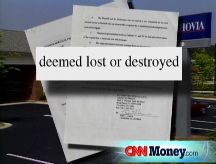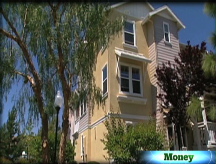Life after losing your home
The nation's housing meltdown is disrupting lives and devastating families. One New York grandmother is trying to put the pieces back together.
HEMPSTEAD, N.Y. (CNNMoney.com) -- Only weeks after moving into their first home in 2006, Margarita Rios celebrated Christmas with her two daughters and their families. They finally had the room to do it right, with decorations outside the Valley Stream, N.Y., house and a nice tree surrounded by presents inside.
"It was very beautiful," said Rios, who had saved for a decade to unite her children and grandchildren under one roof. "It was a dream come true."
Christmas 2008, however, is shaping up to be a nightmare. No decorations. No tree.
No house.
In February, faced with an unexpected jump in her monthly mortgage bill, Rios stopped making payments and abandoned the home, shattering her life and scattering her family.
She and her new husband moved into a tiny rental apartment in Brooklyn and are trying to negotiate with the bank to sell the house without foreclosing. One daughter relocated to Queens, while the other is heading back to Mexico with her three children to escape New York's high cost of living.
Rios is among the growing ranks of Americans trying to put their lives back together after losing their homes. About three million people were delinquent on their loans and one million homes were in foreclosure as of March 31, according to the Mortgage Bankers Association.
No one keeps track of what happens to people after they give up their homes, but their options generally are limited. Some move in with friends or family, while others end up living in their cars or in homeless shelters. Those with some means, like Rios, squeeze into rental apartments.
Rios knew when she bought the house she'd have to skimp to make the mortgage payments. But she felt it was worth it.
"It was a sacrifice but at least we'd have a home," said Rios, who spoke through a translator and asked to be identified by her middle name. "Even though we were struggling, we were together and I was able to be with my grandkids."
But counselors at the Nassau County Homeownership Center, to whom she turned for help in January, said they've seen cases like Rios' too many times in recent years: New homeowners losing their houses after getting mortgages they didn't understand and couldn't afford.
"That type of loan should never have been made," said Haydee Rosario, a homeownership counselor at the center.
$4,100 monthly mortgage
Rios' housing saga began in 2006 when she approached a real estate agent to see whether she could qualify for a home. Since emigrating from Mexico in 1995 with her daughters, then ages 15 and 16, she had been renting apartments in Brooklyn and Queens. After working at her brother's restaurant for a few years, she got a job at a Brooklyn factory making party goods, where she's still employed.
Despite relatively meager earnings - she makes $25,000 a year at the factory - she managed to save $20,000 for a downpayment. Careful use of credit cards helped her establish a good credit history.
Ironically, it was this financial prudence that led to her downfall. Her nest egg and good credit score qualified her for an adjustable-rate loan that didn't require documentation of her income.
Soon, Rios was the owner of a $489,000 four-bedroom home with a monthly mortgage payment of $4,100. She and one daughter split the two bedrooms upstairs, while her older daughter lived on the ground floor with her husband and two young children.
With her daughters each paying $1,500, she could cover the remaining $1,100. The real estate agent said she could refinance within two years and lower her payments.
Instead, the opposite happened. This past January, the monthly payments jumped to nearly $4,400, overwhelming the family. They were already struggling to make the payments and even a $300 increase was too much to bear.
She turned to the Homeownership Center, but the counselors couldn't persuade the lender to modify the terms. Though it was difficult for her to accept, Rios decided to let the home go.
"We just couldn't do it," said Rios, who is in her 40s. "It was taking everything we had. It was just too much."
Paying the price
With the center's assistance, Rios is negotiating with her lender to do a short sale, in which she would sell the home and turn over the proceeds to the bank, which would then agree to forgive the remaining debt. But it might be tough to get the lender to go along since she now owes $503,000, including interest and late fees, and the home is only worth $372,800. If they can't agree on terms or the home doesn't sell, Rios faces being put into foreclosure.
The stress is taking its toll. She's not sleeping, suffering from headaches and having trouble eating, noting that she's already lost a dress size. She doesn't know what she'll do with all her belongings, most of which are still in the house, since they won't fit in her studio. And she fears she'll be arrested for being delinquent, even though the counselors have told her otherwise.
"Not being able to pay the debt is weighing on me," she said. "And I lost all this money I worked so hard for."
Most of all, however, she's devastated at the scattering of her family. She's concerned her older daughter's children will not have as good a life in Mexico as they could have in the United States. And she doesn't often see her younger daughter's new baby because Rios has to work Saturdays and take care of household matters on Sundays. When they were all living together, having the grandchildren around made her forget about her problems, she said.
Still, despite all her troubles, Rios has not given up.
"I have to be strong to keep moving forward," she said. "I have faith I'll overcome and be in a better place in the future." ![]()





